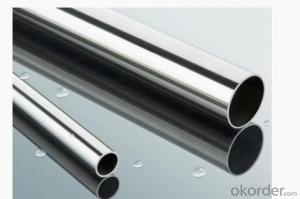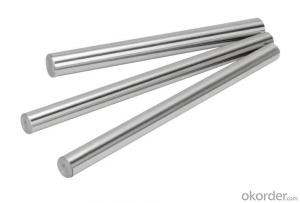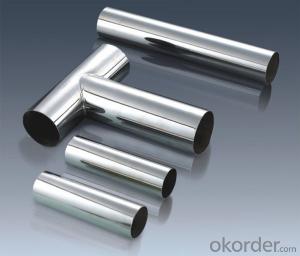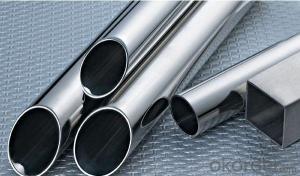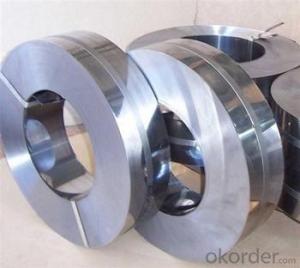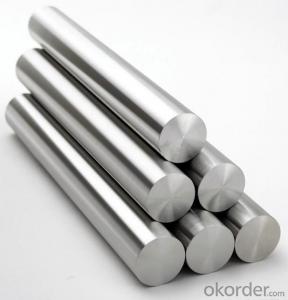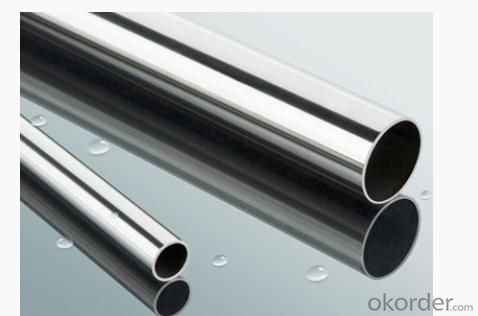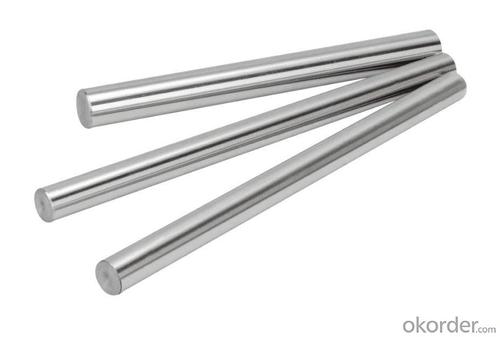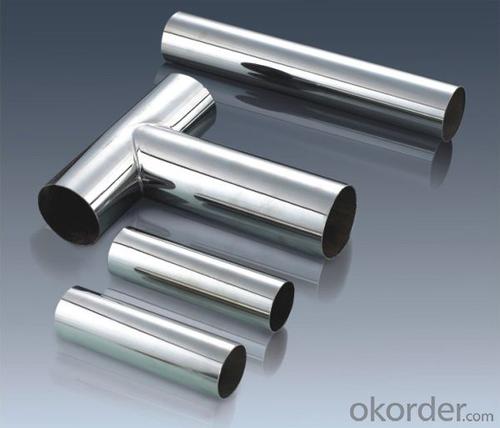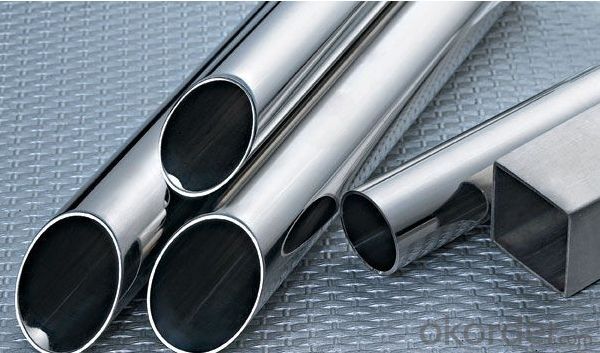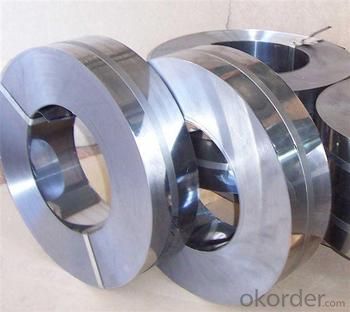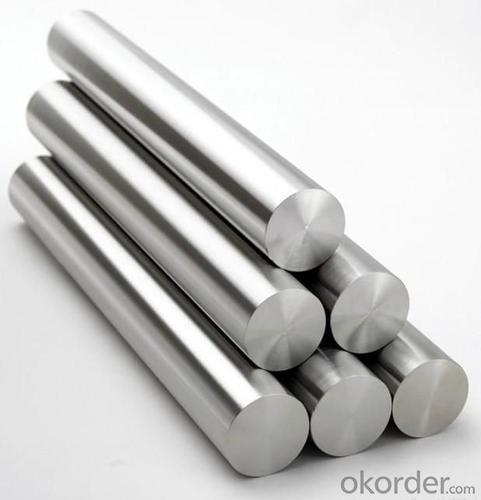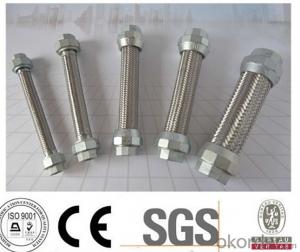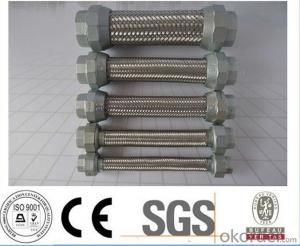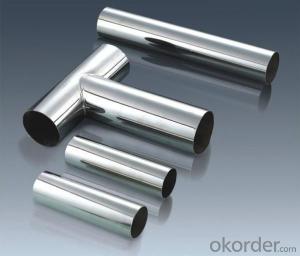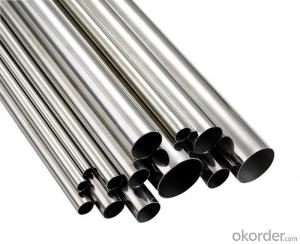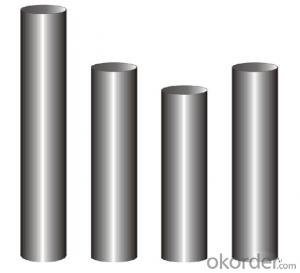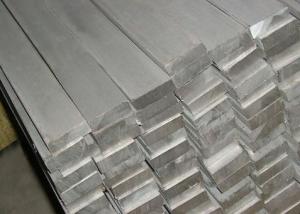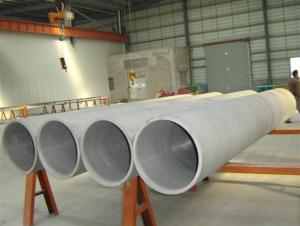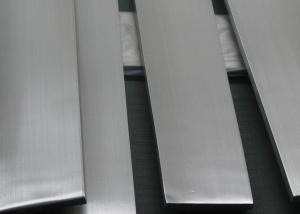Stainless Steel tube 304 with excellent quality and cheap pricing
- Loading Port:
- Shanghai
- Payment Terms:
- TT OR LC
- Min Order Qty:
- 1000 m.t
- Supply Capability:
- 1000000 m.t/month
OKorder Service Pledge
OKorder Financial Service
You Might Also Like
Stainless steel 304
Product Information of stainless steel:
- Width: customized
- Surface: 2B/BA/6K/8K/NO.4/HL.
- Thickness: 0.3mm - 3.0mm.
- Delivery time: 15-25 days.
- Length : As customer's requirement.
- Package: With export standard packing or customize packing.
- Payment Terms: T/T (30% deposit pay in advance and the balance before shipment) , irrevocable L/C.
Company advantage:
-Top Equipments, Leading In The Industry.
- Professional Team, Leading Innovation.
- Huge Supply Capacity Advantage, Timely and Effective Delivery.
- Modern Logistic, Fact and Convenient.
- Precise Manufacturing, Exquisite Products.
- Serve People, Create Value.
- Dimensional Network, Powerful Expansion.

- Q: Can stainless steel pipes be used for underground drainage?
- Yes, stainless steel pipes can be used for underground drainage. Stainless steel is a highly durable and corrosion-resistant material, making it suitable for various applications, including underground drainage systems. It offers excellent resistance to rust, corrosion, and chemical damage, ensuring a long lifespan and minimal maintenance requirements. Additionally, stainless steel pipes have high strength and can withstand high-pressure conditions, making them ideal for underground drainage where they may encounter external load or stress. Furthermore, stainless steel pipes are known for their smooth inner surface, which helps to prevent clogs and facilitate the efficient flow of water and waste. Overall, stainless steel pipes are a reliable and long-lasting choice for underground drainage systems.
- Q: Can stainless steel pipes be used for chemical processing?
- Indeed, chemical processing can indeed utilize stainless steel pipes. One must acknowledge stainless steel's remarkable ability to resist corrosion, rendering it an apt material for handling a diverse range of chemicals. It effectively wards off both organic and inorganic substances, including acids, bases, and salts. Moreover, stainless steel pipes exhibit commendable strength, durability, and resistance to extreme temperatures, enabling them to endure the often severe conditions prevalent in chemical processing. In addition, their ease of maintenance and cleaning renders them a favored choice within the industry. Nevertheless, it remains crucial to carefully consider the specific requirements of the chemicals involved and seek counsel from experts to select the most suitable grade of stainless steel, ensuring optimal performance and safety.
- Q: What is the cost difference between stainless steel pipes and other materials?
- The cost difference between stainless steel pipes and other materials can vary depending on factors such as the type of material, size, and quality. Generally, stainless steel pipes tend to be more expensive than materials like PVC or galvanized steel. However, stainless steel pipes offer superior durability, corrosion resistance, and longevity, making them a worthwhile investment in many applications.
- Q: Can stainless steel pipes be used for oil and gas refineries?
- Yes, stainless steel pipes can be used for oil and gas refineries. Stainless steel is a highly durable and corrosion-resistant material, making it suitable for the harsh and corrosive environments found in refineries. It can withstand high pressures, extreme temperatures, and exposure to various chemicals and corrosive substances commonly found in oil and gas operations. Additionally, stainless steel pipes offer excellent resistance to erosion, pitting, and cracking, ensuring the integrity and longevity of the pipeline system.
- Q: What is the difference between 304LN and 316LN stainless steel pipes?
- The composition and inclusion of certain elements distinguish 304LN and 316LN stainless steel pipes from each other. 304LN stainless steel is an austenitic type that contains a low amount of carbon and nitrogen. Its purpose is to provide better strength and corrosion resistance compared to standard 304 stainless steel. The addition of nitrogen encourages the formation of a stable austenite phase, which improves the mechanical properties of the material. On the contrary, 316LN stainless steel is also an austenitic variety but has molybdenum and a higher nickel content compared to 304LN. The inclusion of molybdenum increases the material's resistance to pitting corrosion caused by chlorides and other aggressive environments. The higher nickel content further enhances the corrosion resistance, making it suitable for more demanding applications, such as marine environments or chemical processing. In conclusion, both 304LN and 316LN stainless steel pipes are austenitic and offer good corrosion resistance. However, the addition of molybdenum and higher nickel content in 316LN makes it more suitable for applications requiring enhanced corrosion resistance, especially in aggressive environments.
- Q: What are the different types of stainless steel pipe insulation?
- There are several types of stainless steel pipe insulation available, including fiberglass, mineral wool, foam, and elastomeric foam. These materials provide different levels of thermal performance, durability, and resistance to moisture and chemicals, allowing users to choose the most suitable option for their specific needs.
- Q: What is the difference between seamless and SAW stainless steel pipes?
- The main difference between seamless and SAW (Submerged Arc Welding) stainless steel pipes is the method of manufacturing. Seamless pipes are formed by piercing a solid billet of steel to create a hollow tube without any welding involved. On the other hand, SAW pipes are made by continuously welding the edges of a steel plate or strip to form a pipe. This welding process can result in a visible seam along the length of the pipe. While both types of pipes offer high corrosion resistance and strength, seamless pipes are generally preferred for applications requiring higher pressure, precise dimensions, and a smoother inner surface, whereas SAW pipes are commonly used for less critical applications where cost and availability are more important factors.
- Q: What is the difference between seamless and double submerged arc welded stainless steel pipes?
- Seamless stainless steel pipes are produced by rolling a solid cylindrical billet of stainless steel after it has been pierced, ensuring a smooth surface without any welds or seams. This manufacturing process gives the pipes higher strength and corrosion resistance due to the absence of potential weak points created by welding. On the other hand, double submerged arc welded stainless steel pipes are made by aligning and welding two separate steel plates using a submerged arc welding process. This welding method uses a flux to protect the weld area from atmospheric contamination. The plates are then joined together to form a pipe by passing them through rollers. These pipes have a visible weld seam along their length. Seamless stainless steel pipes are preferred in applications where high pressure, high temperature, or corrosive environments are present. They eliminate the risk of leakage and enhance the overall structural integrity of the pipe. In contrast, double submerged arc welded stainless steel pipes are often chosen for their cost-effectiveness. They are less expensive to produce compared to seamless pipes and are commonly used in industries such as oil and gas, petrochemical, and water distribution. In conclusion, the main difference between seamless and double submerged arc welded stainless steel pipes lies in their manufacturing process and resulting characteristics. Seamless pipes have a smooth and continuous surface without any welds or seams, while double submerged arc welded pipes have a visible weld seam. The choice between these types of pipes depends on factors such as cost, application requirements, and the desired level of strength and corrosion resistance.
- Q: How do stainless steel pipes compare to copper nickel pipes?
- Stainless steel pipes and copper nickel pipes have different properties and are suitable for different applications. Stainless steel pipes are highly resistant to corrosion, making them ideal for applications where exposure to moisture or chemicals is a concern. Copper nickel pipes, on the other hand, offer excellent resistance to seawater corrosion, making them commonly used in marine environments. Additionally, copper nickel pipes have superior thermal conductivity compared to stainless steel pipes. Ultimately, the choice between stainless steel and copper nickel pipes depends on the specific requirements and conditions of the intended application.
- Q: What is the difference between 410 and 316 stainless steel pipes?
- The main difference between 410 and 316 stainless steel pipes lies in their chemical composition and their intended applications. 410 stainless steel is a martensitic stainless steel, which means it has a high carbon content (between 0.15% and 0.25%) and a relatively low chromium content (between 11.5% and 13.5%). This composition gives 410 stainless steel pipes excellent strength, hardness, and wear resistance. It is often used in applications where corrosion resistance is not the primary concern, such as in cutting tools, knives, and firearm components. On the other hand, 316 stainless steel is an austenitic stainless steel with a higher chromium content (between 16% and 18%) and a significant amount of nickel (between 10% and 14%). This composition gives 316 stainless steel pipes excellent corrosion resistance, especially in environments with chlorides or other corrosive agents. It is widely used in industries such as chemical processing, pharmaceuticals, food processing, and marine applications. In summary, the main difference between 410 and 316 stainless steel pipes is their chemical composition and the resulting properties. 410 stainless steel offers superior strength and hardness but has lower corrosion resistance compared to 316 stainless steel, which is highly corrosion resistant but may have slightly lower strength and hardness. The choice between the two depends on the specific requirements of the application, with 410 stainless steel being more suitable for applications where strength and wear resistance are crucial, and 316 stainless steel being preferred for applications requiring excellent corrosion resistance.
Send your message to us
Stainless Steel tube 304 with excellent quality and cheap pricing
- Loading Port:
- Shanghai
- Payment Terms:
- TT OR LC
- Min Order Qty:
- 1000 m.t
- Supply Capability:
- 1000000 m.t/month
OKorder Service Pledge
OKorder Financial Service
Similar products
Hot products
Hot Searches
Related keywords
